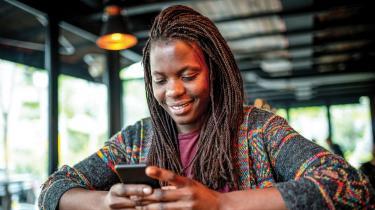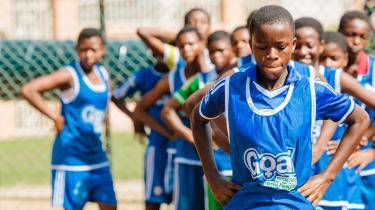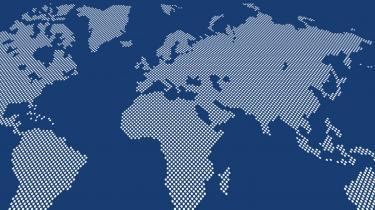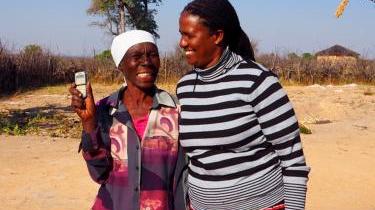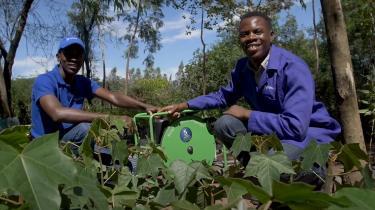Youth unemployment and gender inequality are widely recognised as major challenges to sustainable development. The ILO estimates that one fifth of all young people are not in employment, education or training; and young women are twice as likely as young men to have this status. There is considerable regional variation, with the gender gap particularly pronounced in regions such as South Asia and parts of the Middle East where social and cultural norms prevent women from pursuing educational or employment opportunities.
The global sustainable development agenda recognises the importance of joint action to reach its goals. It is not only governments and civil society which have a role in addressing the challenges which waste young people’s potential and damage their futures, the private sector too has a key role to play, both as an employer and a funder of initiatives. Standard Chartered is a large private sector company which embraces this role and is investing in change, but wanted to understand better what its funding and support was achieving. It engaged Triple Line to provide the expertise it needed to do this.
Standard Chartered is an international bank headquartered in London with presence in more than 60 diverse emerging and developed markets. Having for many years supported health and girls’ education projects, in 2019 the Bank launched ‘Futuremakers by Standard Chartered’, a global initiative to empower young people, especially women, to ‘learn, earn and grow’ through programmes focused on education and empowerment, employability and entrepreneurship. As well as a target budget of US$75 million to fund local implementing partners, Futuremakers provides opportunities for Standard Chartered staff to volunteer and share their expertise with the young people reached through the programmes.
Futuremakers by Standard Chartered is a global initiative to tackle inequality and promote economic inclusion. It aims to release the potential of young people, especially women, and increase their participation in the economic life of their country as employees, entrepreneurs, consumers and citizens
Having gathered good information about the numbers of young people reached by its projects to date, including by gender, and many examples of individuals whose lives had changed for the better, Standard Chartered wanted Futuremakers to go further. They wanted clear evidence of the results of Futuremakers projects for the young people reached by them, and to demonstrate the effectiveness of the initiative to both the bank (its main funder) and also individual staff, who give both their time and their money to support it.
Futuremakers needed a clear framework for monitoring and evaluating its impact, and a clear implementation plan setting out the responsibilities of the many different parties involved in operating it: grantee organisations across many countries who were running the projects and working with young men and women, country offices, global implementing partners who would manage a portfolio of grants, and the sustainability team in Standard Chartered who manage Futuremakers as a whole and report to the Management Team and Board. Implementing the M&E framework would also need a set of tools (indicators, questionnaires, surveys) to define, collect and analyse data; guidance manuals; and a simple management information system to store and organise the data so that results can be aggregated and reported clearly to the Board, enabling strategic decisions about future funding.
Our team brought together expertise in designing practical monitoring, evaluation and learning systems and in youth employment, gender and social inclusion. We worked closely with the Standard Chartered team to understand what they needed and expected, and took the time to understand and build on the experience and systems of the long-running ‘Goal’ programme for girls’ empowerment, run by NGO Women Win, which is part of Futuremakers.
Our first challenge was to build a coherent overarching narrative for the Futuremakers programme, which had the overall ambition of increased economic inclusion but was achieving this through several different approaches. This would help to define and communicate Futuremakers. A workshop with Standard Chartered and Women Win at the start of our assignment helped to define the overall aim – what did ‘increased economic inclusion’ really mean? – and then set out how project interventions (for example, employment-related training, or role play workshops for girls on their rights) could lead to measurable change (for example, an increase in skills or knowledge, or awareness of rights and services) and longer-term outcomes (such as decent employment and youth leadership) to achieve it. Separately, we provided Standard Chartered with a literature review of ‘what works’ in youth employment, empowerment and entrepreneurship interventions, to inform thinking about the types of projects to fund; and prepared a paper on target setting for the results that might be expected from different levels of engagement and investment.
The theory of change which we developed following the workshop provided a basis for the Triple Line team to design a single results framework for the whole Futuremakers initiative. The results framework set out a suite of indicators at ‘output’ and ‘outcome’ level together with data collection tools for implementing organisations to use to measure and report results, broken down by age and gender. We designed handbooks tailored to potential Futuremakers applicants and to existing grantees, to explain Futuremakers’ aims, how individual projects could work towards those aims, and expectations for good quality results reporting. We built an online system which implementers could use to report results, and a database which the results would be stored in, to generate aggregated Futuremakers results. This monitoring system was underpinned by a clear implementation plan which set out the responsibilities of each party to make it work. The framework, implementation plans and management information system were introduced across Standard Chartered and to strategic and local charity partners through a set of online webinars, each tailored to the specific audience.
Standard Chartered’s new Futuremakers initiative has a robust but flexible results monitoring system which will provide good quality evidence of the impact it is having. Implementing organisations can use the system in a way that is appropriate to their own project and context and contribute their results into the aggregate picture. The aim of Futuremakers and how it expects to achieve it is clearly set out for fund applicants, current grantees and Standard Chartered staff and stakeholders. Standard Chartered has now engaged Triple Line as its Results Monitoring Team, to roll out and manage the system. We have run introductory workshops for implementing partners and have started one-to-one sessions with each of them to help them to start to use the M&E system, recognising that their level of knowledge and experience of M&E will vary greatly.
(1) Global Employment Trends for Youth 2020: Technology and the future of jobs, International Labour Office – Geneva: ILO, 2020
(2) The Bank’s ambition is to raise US$50 million between 2019 and 2023 to empower the next generation to learn, earn and grow. In 2020. In response to the Covid-19 pandemic, the Bank announced a further US$25 million to support the economic recovery of affected communities.
Credits: title photos by Futuremakers Forum | Standard Chartered
